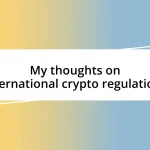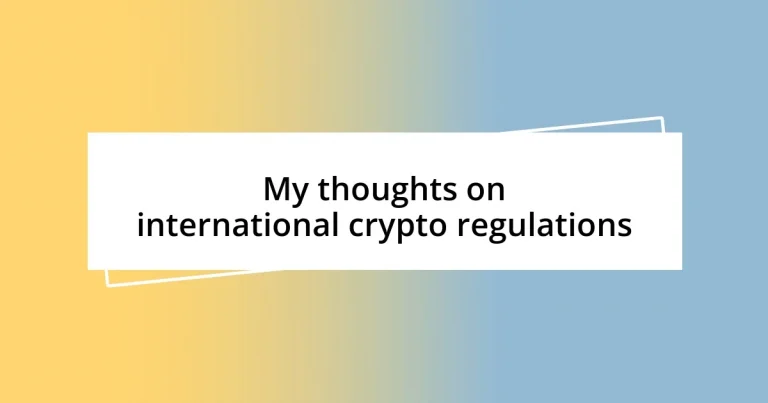Key takeaways:
- Global crypto regulatory frameworks vary significantly, with countries like Japan embracing clear guidelines while others, such as China, impose harsh restrictions.
- Key players, including the FATF and IMF, are advocating for international cooperation to develop unified crypto regulations that balance innovation with safety.
- Future trends indicate a shift towards tech-savvy regulatory frameworks and improved collaboration among regulators, potentially increasing market appeal for mainstream investors.
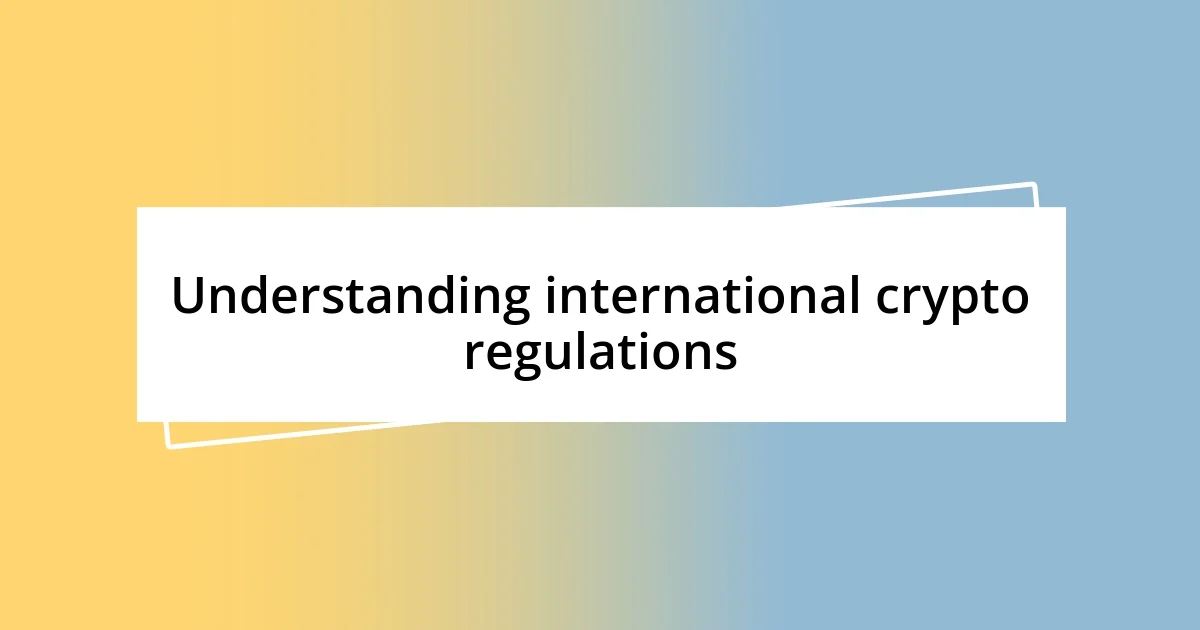
Understanding international crypto regulations
Understanding international crypto regulations is crucial as cryptocurrency transcends borders. I recall my first encounter with blockchain technology; I was amazed by its potential to revolutionize financial systems globally. Yet, I quickly realized that without a cohesive regulatory framework, this innovation could lead to chaos and uncertainty.
It’s fascinating, isn’t it, how different countries approach crypto regulations? Take my experience in Japan, where they embraced Bitcoin and implemented strict guidelines. I’ve always been curious how their proactive stance contrasts with places like China, where crypto is heavily restricted. Such disparities raise questions about the future of global commerce and the role of regulation in shaping it.
Navigating these regulations is like walking through a maze. There are aspects of consumer protection, anti-money laundering (AML) measures, and taxation issues that vary widely. Often I find myself pondering—how can creators and investors thrive amid such complexity? It’s clear we need a more collaborative international effort to provide a balanced regulatory environment that fosters innovation while protecting stakeholders.
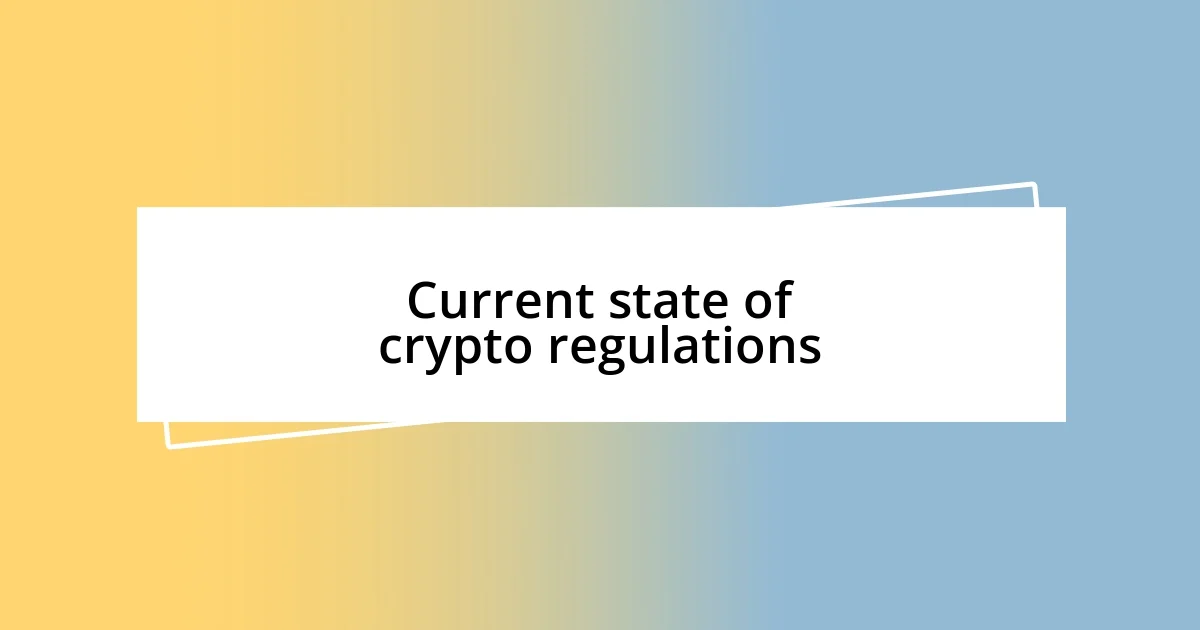
Current state of crypto regulations
The current landscape of crypto regulations is incredibly dynamic. Countries are still trying to figure out how to balance innovation with safety. I remember attending a blockchain conference where regulators from the U.S. and Europe shared their approaches. It was striking to see their differing priorities. While Europe emphasizes strict compliance, some U.S. states are experimenting with more lenient frameworks to attract startups.
In my experience, the regulatory environment often feels like a patchwork quilt. Countries like the United States and the European Union develop their policies with extensive public debates, while others adopt a more authoritarian approach. For instance, in Brazil, the government has just begun laying out guidelines, but the pace is slow and frustrating. As someone who follows these developments closely, I can’t help but feel a mix of hope and concern for how these regulatory measures will evolve.
Interestingly, the global dialogue is shifting. It seems like there’s a growing consensus on the need for international standards. Take the Financial Action Task Force (FATF), for instance; they’ve started recommending unified guidelines that can stem the tide of illicit activities while supporting innovation. I often wonder—will this create a more level playing field for crypto businesses worldwide? That’s something I look forward to observing closely.
| Country | Regulatory Approach |
|---|---|
| United States | Varied regulations by state, focusing on compliance with federal laws |
| European Union | Strict compliance and consumer protection measures being developed |
| China | Harsh restrictions on crypto trading and initial coin offerings (ICOs) |
| Japan | Proactive adoption with clear licensing requirements |
| Brazil | Slowly developing regulations, with a focus on future guidelines |

Key players shaping the regulations
When we talk about key players shaping international crypto regulations, a few entities stand out. Regulatory bodies, governments, and even influential international organizations play critical roles. I remember a conversation I had with a compliance officer from a major bank; she emphasized how regulatory frameworks can either stifle or invigorate innovation in the crypto space.
Some of these key players include:
- Financial Action Task Force (FATF): Championing international cooperation to combat money laundering and terrorism financing through unified crypto guidelines.
- International Monetary Fund (IMF): Actively advising nations on adopting regulations that address both innovation and financial stability.
- National Regulators: Entities like the U.S. Securities and Exchange Commission (SEC) and the European Securities and Markets Authority (ESMA) influencing regional frameworks.
- Industry Groups: Organizations such as the Blockchain Association and the Chamber of Digital Commerce advocating for favorable regulations that promote growth.
- Technology Innovators: Companies and developers who push the boundaries of what’s possible often drive discussions about what regulations are necessary.
It’s intriguing, really; when I think about how these players interact, it feels like a dance of sorts, each trying to assert their influence while navigating the complexities of a rapidly evolving landscape. I recall attending a meeting where the conversation shifted quickly between the urgency for regulation and the fear of stifling creativity. It’s a fine line, one that can define the crypto ecosystem’s very future.
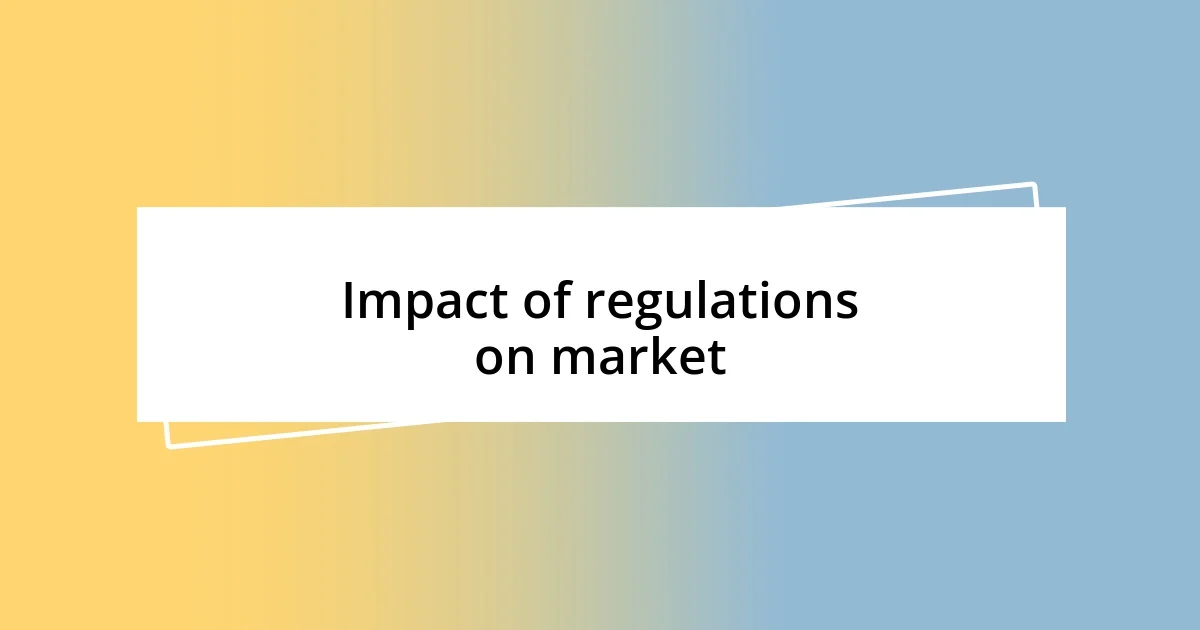
Impact of regulations on market
Regulations can have a profound impact on the crypto market, often acting as both a gatekeeper and a catalyst for growth. When I was engaging with a group of crypto traders recently, I noticed a palpable tension in the air. Many felt that regulations could either legitimize the space or choke off innovation entirely. It’s fascinating how the introduction of rules can instill confidence in some investors while driving others to seek more permissive environments elsewhere.
I’ve observed that strict regulations tend to create barriers for new players, particularly smaller startups that may not have the resources to comply. This reminds me of a small blockchain project I supported early on; they struggled under mounting compliance costs and eventually had to pivot or close down. Have we considered how this might stifle diversity in the market? A rich tapestry of innovative companies is essential for the ecosystem to thrive, yet regulations can sometimes favor larger, established players.
On the flip side, I do see the potential positives. Effective regulations can enhance trust among traditional investors and institutions, leading to increased capital inflow. I recall discussing this with a financial analyst who was optimistic about how clearer rules might open the doors to institutional investment. Isn’t it intriguing how the right balance of regulation could actually propel the market forward instead of holding it back? That’s the delicate dance we’re witnessing in the crypto world today.
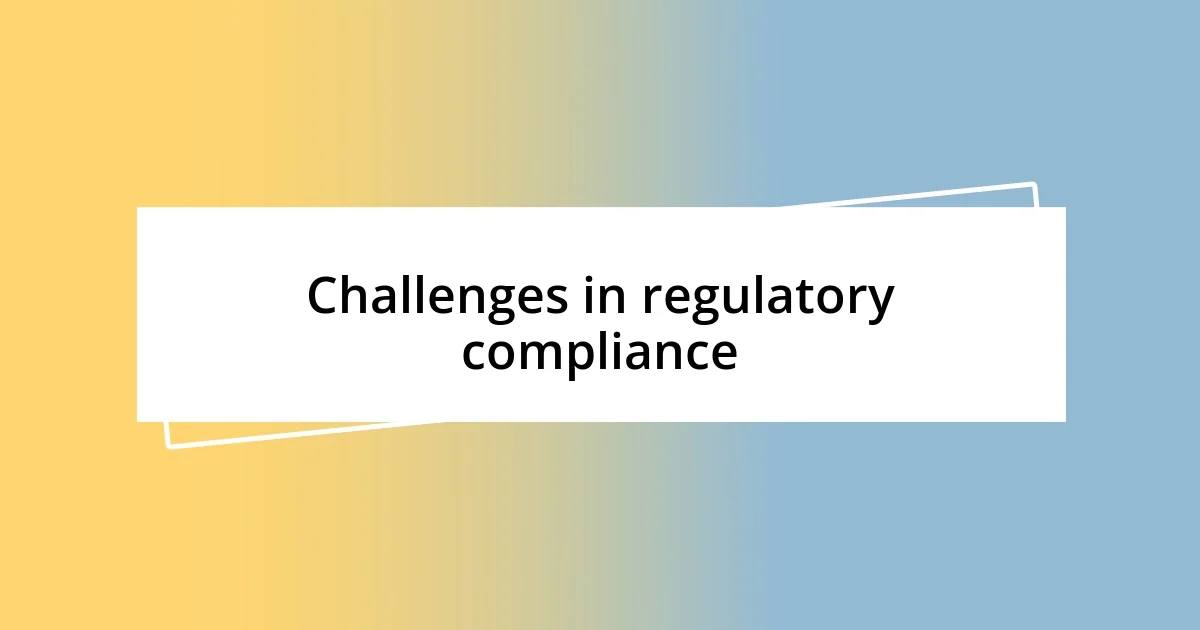
Challenges in regulatory compliance
Navigating the maze of regulatory compliance in the crypto world feels like attempting to find your way through a foggy landscape. I remember having a coffee with a start-up founder who expressed frustration over ever-shifting guidelines. Each jurisdiction seems to have its own set of rules, making it a challenge for projects to remain compliant without dedicating substantial resources to understanding them all. Isn’t it overwhelming to think about how smaller firms might struggle to keep pace with these demands?
Moreover, the ambiguity surrounding cryptocurrency classification adds another layer of complexity. From my experience, I’ve seen projects grapple with defining whether their tokens are securities or utility tokens. This isn’t just a technicality; it can make or break a project depending on how regulators choose to interpret these definitions. I had a conversation with a legal expert who shared stories of companies facing hefty fines for misclassification. It kind of makes me wonder: how many potential innovations are we losing because of this uncertainty?
Finally, let’s not forget the daunting administrative burden that compliance can impose. I recently spoke with a compliance officer who detailed the exhaustive processes that companies must undergo to ensure adherence to regulations. It was eye-opening; many firms find themselves diverting attention away from growth and innovation to meet compliance demands. This begs the question—how can the industry strike a balance between necessary oversight and encouraging creativity? It’s a tough nut to crack, and I genuinely feel that this dilemma deserves more conversation among us all.

Future trends in crypto regulations
The landscape of crypto regulations is bound to evolve significantly in the coming years. I’ve often thought about how global collaboration among regulators could streamline compliance processes. Imagine a world where harmonized standards exist across jurisdictions—smaller firms could breathe easier, focusing on innovation rather than drowning in a sea of varying regulations. Isn’t it exciting to think how such cooperation might fuel a more vibrant and diverse crypto ecosystem?
One trend I anticipate is the rise of more tech-savvy regulatory frameworks. From my own experiences in tech discussions, I’ve seen how innovative technologies like blockchain could be harnessed to monitor compliance in real-time. Could we reach a point where automated systems not only track transactions but also help companies stay compliant without excessive manual oversight? This sort of advancement might not only reduce the burden but also instill greater trust within the market.
Additionally, I can’t shake the feeling that as regulatory clarity improves, the market will likely become more attractive to mainstream investors. Reflecting on conversations with friends curious about getting involved in cryptocurrencies, I’ve noticed many hesitate purely due to what they perceive as a chaotic regulatory environment. If future regulations strike a balance and enhance transparency, wouldn’t it be fascinating to witness a surge in participation from traditional investors bolstering the entire industry? The potential is truly there, and I’m excited to see where it leads us.

Best practices for navigating regulations
When it comes to navigating regulations, staying informed is crucial. I recall a time when I attended a crypto conference and struck up a conversation with an industry veteran who emphasized the importance of joining relevant forums and networking groups. Engaging with experts who are constantly updating their knowledge can be invaluable. How often do we overlook the power of community and mentorship in understanding complex compliance issues?
Another best practice involves establishing strong relationships with legal advisors who specialize in cryptocurrency regulations. I remember hiring a compliance consultant for a project, and it was a game changer. Their expertise provided clarity on intricate regulatory matters, reducing our anxiety about potential pitfalls. Don’t you think having a knowledgeable ally can make all the difference when navigating such turbulent waters?
Lastly, adopting a proactive compliance mindset is essential. I’ve experienced firsthand the benefits of integrating compliance from the outset rather than treating it as an afterthought. Setting up clear protocols and regular audits creates a culture of accountability. Isn’t it empowering to realize that by being proactive, we can not only reduce risk but also position ourselves favorably in an ever-evolving market? This mentality may just give your project that competitive edge it needs.








